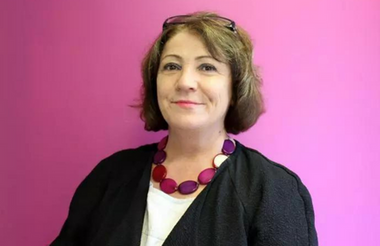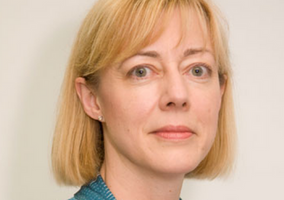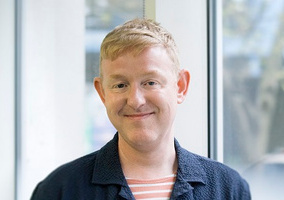Annwen Jones has been chief executive of Target Ovarian Cancer (TOC) since she co-founded the charity in 2008.
Jones’ career in the sector began 30 years ago. After making the change from working in higher education, she joined the Juvenile Diabetes Research Foundation (JDRF). Within two years Jones was made chief executive, a role she stayed in for just over 13 years.
The chief executive says she faced cynicism at JDRF where the goal was to find a cure for type 1 diabetes “and everybody said you can't do it”.
She describes a similar “appalling” attitude when she first started working in ovarian cancer. This attitude implies “debilitating” symptoms women are experiencing, such as bloating, abdominal pain, and difficulty eating “are somehow okay”, Jones argues.
“Of course you can do something about it and if you decide something is too difficult, then nothing will happen.”
Co-founding Target Ovarian Cancer
When Jones began working in ovarian cancer, she was shocked. “I didn't really know anything about ovarian cancer, let alone the symptoms, even though I was at an age where I should have known because I was beginning to fall into the higher risk group in terms of age.
“While there was some work going on in ovarian cancer, it just seemed to be trapped in this vicious circle of very low survival, very low awareness, very little money going in, and therefore very little research.”
Jones met Joanna Barker, a former private equity professional whose mother and sister had both died from ovarian cancer within about six months of one another. Barker was keen to do something meaningful that would prevent other families and women going through the same.
“It was kind of a meeting of minds,” reflects Jones, as Barker came with her business experience, and Jones had a good understanding of the charity sector and the importance of engaging, building and mobilising with a community.
The pair ultimately co-founded TOC, though Jones says: “It was never my career aspiration to set up a charity.”
She did so as she felt that she had the skills and “it was a little bit irresistible” given her experience of knowing what good practice looks like in organisations, and “being able to craft that from the beginning, and in a disease area that clearly had been overlooked”.
“This is a really important women's health issue” says Jones, but women had been “marginalised,” and would stay marginalised “unless something changed”.
“What I was thinking would be a short-term helping hand has turned into a much longer-term relationship.”
‘A huge nightmare’
Jones remembers leaving TOC’s offices “with our hair on fire” on the announcement of the government’s first lockdown to curb the spread of Covid-19.
“I knew pretty quickly, without having to do much maths, that we would lose about £0.5m over the following three months because we were entering peak fundraising season, coming up to the end of our financial year.”
That is around 20 to 25% of the charity’s annual income, so although it was in a relatively strong financial position before the pandemic, it feared that it would run out of money within six months.
“That was one huge nightmare,” says Jones, but “the real heart-sink moment” was thinking about the “potentially absolutely catastrophic” impact on the charity’s beneficiaries.
“I found that quite traumatic. Trying to figure out what we could do as an organisation to support our community given that situation.”
TOC quickly got an emergency appeal out. “It wasn't the most eloquently written, it certainly wasn't beautiful, but we knew that we had to get the money to protect our service.”
By the summer of 2020, the charity had received an “incredible” amount of support. So, although there was money lost from fundraising events, “a lot of people did step forward from our own community but also complete strangers”.
Ultimately, the charity received enough money to get back to the position it was in just before the pandemic, and is now growing.
This meant a year on it could move from “just firefighting” back to core work.
Nonetheless, for Jones in the midst of the pandemic “there was an element of despair, that everything we had worked for was going to be for nothing”.
“That felt very depressing,” she says. “I did feel in that worst case scenario, the charity would not survive and all of the progress would have been nothing. But I think I managed to lift myself out of that fairly quickly.”
Jones says the charity’s shift to take make better use of technology was one positive thing to come out of the pandemic period. TOC realigned its services to become more digital at “lightning speed” as it had done “very little digital” previously, she says.
“Because of the investment in digital the charity has grown significantly over the past year - we are much bigger than we were before Covid-19.”
Jones says: “Sometimes something is so obvious that you completely miss it.” The charity is now supporting more women than previously, including those unable to attend face-to-face events, “and they potentially were the ones who were most in need”.
Further pressure from cost-of-living crisis
“We've now got the cost-of-living crisis and I'm almost more worried about that than I was about lockdown,” says Jones.
She suggests part of the reason the public donated to the charity during the pandemic was because the furlough scheme protected some people's incomes.
“Now I am worried because I think it's inevitable that there will be some negative impact on income for the charity sector. I just don't think that the kind of government support will be there this time for people, for individuals.”
TOC is looking at how to reconfigure its fundraising portfolio, “but we've also got an increase in demand for services that we saw during Covid-19.”
Jones says the cost-of-living crisis will bring the two pressures that were there during pandemic; the downward pressure on income, and the upward pressure on demand for services, but possibly without any safety net. “That's what worries me,” she says.
Campaigning: ‘Have the legitimacy of your community’
One in 50 women will get ovarian cancer in their lifetime, and a key focus for TOC is on earlier diagnosis, and therefore raising awareness of symptoms – which has been “quite an uphill struggle”.
There is a perception that ovarian cancer symptoms are only noticeable later on, Jones says, though research shows symptoms do appear at an early stage and there is an opportunity to intervene.
Jones says women have quite often been back and forth to a GP, and have been diagnosed in A&E when they are extremely unwell. Even now, 14% of women die within two months of diagnosis.
“It's just not okay, in particular when you know that could be very different. So, I think there is an important issue of health inequity.”
Jones says it is “really tough” working in an area where levels of awareness are not high. “You have just as many challenges, if not more, when it comes to trying to help move the disease forward in terms of driving better outcomes and better survival and wellbeing – so you've got to be very strategic.”
The organisation has made progress, but data shows awareness is still low. For example, only one in five women are aware bloating is a key symptom of ovarian cancer.
TOC is calling for the government to intervene with support “because we can't do it, don't want to do it, all on our own”.
“We've been campaigning really hard in parliament for many years,” says Jones, as when the charity started “there was no campaigning going on in ovarian cancer”.
Jones says there's always a balance for charities in campaigning, “treading the line between engaging, providing the evidence and influencing … alongside keeping everyone on side”.
Ultimately, “you do have to make sure that you're raising the volume around your issue” and, Jones says, “I don't think we've ever considered that we should not be campaigning”.
Jones says if you are working with a community that is deeply affected by something and it is that community that is speaking, “I think that it is incredibly difficult for that to be dismissed by anybody”.
“It is a challenge getting your voices heard and it's very easy to do the wrong thing. While your instinct is always to speak truth to power, you have to make sure you are doing that in the correct way and that you have the legitimacy of your community.
“We can guide so much, but it's much more effective for them to be speaking than for us to be throwing hand grenades – I don't think that's particularly helpful actually, it always feels counterproductive.”
Jones says for smaller charities working in collaboration is key, because on their own “we are never going to be able to find all the answers”.
“You can't just have aspirations, you have plans and those plans have to be funded. You've got to put your money into it.”
“We have seen a lot of improvement in the last 14 years, and hit a lot of milestones, but the key point is women are still being failed in ovarian cancer and we need to see substantial and positive government action in this. This is the most lethal of the genealogical cancers, and if we can’t get change in this area then we are failing pretty badly.”
Related Articles
Sue Ryder CEO: ‘We have full-time staff using food banks’
Heidi Travis speaks to Harriet Whitehead about the recruitment crisis the sector is facing, reaching unmet need and partnership working
Chris Sherwood: ‘We must challenge the perceptions of what a charity leader looks like’
RSPCA’s chief executive discusses his experiences in the sector and how charities can support staff from less privileged backgrounds to thrive
Farah Nazeer: ‘Charities need the courage of their convictions to speak out’
Farah Nazeer, chief executive at Women's Aid, speaks to Harriet Whitehead about how the charity is campaigning to challenge misogynistic culture and end domestic abuse













